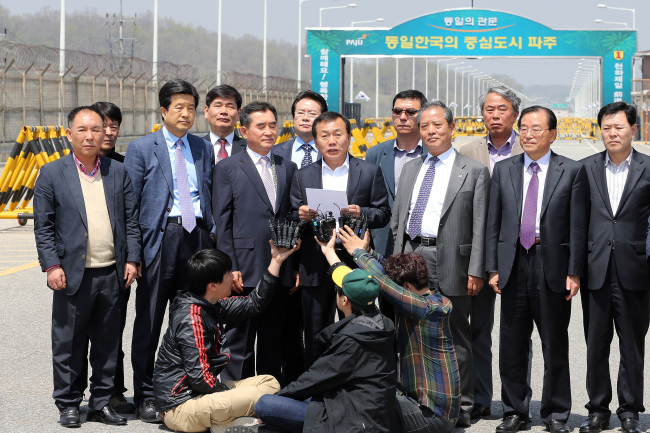
Han Jae-kwon (center), head of the Gaeseong Industrial Complex Companies Association, speaks to
reporters near the checkpoint of the Unification Bridge in Paju, Gyeonggi Province, after being refused
entry to the inter-Korean industrial park on Tuesday. (Yonhap News)
The fate of the Gaeseong industrial park appeared to be hanging in the balance on Tuesday as Seoul remained firm that the inter-Korean project cannot normalize without Pyongyang showing change and accepting dialogue. “It is pointless to normalize operations at the Gaeseong Industrial Complex if it entails accepting unreasonable claims and preconditions,” Unification Minister Ryoo Kihl-jae told a gathering of the National Unification Advisory Council.
“Operations at Gaeseong will return to normal as soon as the North realizes its actions were wrong and backtracks on the measures taken so far.”
North Korea, on the other hand, continued to place the blame on the South for the suspension of the last symbol of cross-border cooperation.
Seven Seoul officials remaining at the stalled factory zone continued discussions over wage and tax payment.
A total of 50 people were initially scheduled to leave the border city late Monday but Pyongyang refused their departure, demanding they first pay some $7.2 million worth of back pay for North Korean workers, telecom bills and income taxes for businesses.
Five officials at the Gaeseong Industrial District Management Committee including chairman Hong Yang-ho are cross-checking detailed claims with their North Korean counterparts, while two KT Corp. employees are facilitating their communication.
Their return “should not take long but will not likely be that early,” a Unification Ministry official told reporters on condition of anonymity because of the sensitivity of the subject.
Despite the Seoul government’s decision to withdraw its citizens, some observers were pinning hopes on the remaining officials as the last communication channel between the two Koreas.
With South Korea-U.S. military drills finished as of Tuesday, a breakthrough may be reached while discussing the payment issue, they said.
“Our government told North Korea that the forum for dialogue remains open and our offer of talks is still valid,” the ministry official said.
“This (normalization) issue can be resolved if responsible North Korean authorities accept the South’s proposal.”
Foreign Minister Yun Byung-se also said Monday that Seoul is “still leaving open the door for dialogue” with Pyongyang.
“While ensuring a firm security posture, the government has been urging North Korea to implement its promises with regard to the Gaeseong complex and resolve the problem through dialogue,” he told a forum hosted by the Foreign Ministry and the private East Asia Institute.
“We will continue to strongly press and strongly strive to convince North Korea to induce a change in its behavior.”
South Korea’s pullout came after Pyongyang on Friday again refused its proposal for talks to reactivate the assembly lines. On Saturday, 125 workers came home.
Pyongyang barred the entry of South Korean employees and cargo starting April 4 and withdrew its 53,000 employees on April 9. The moves came after weeks of threats of a nuclear strike amid Seoul-Washington military drills and U.N. sanctions over an atomic test.
Though the communist state would unlikely push ahead with an entire shutdown of the complex, it appears not ready yet to return to the negotiating table.
Executives of the Gaeseong Industrial Complex Companies Association again failed to cross the border on Tuesday as the North kept mum about their request.
The Minju Chosun, the official daily of North Korea’s Cabinet, said in an editorial that “the people will not condone” the South if it completely “broke apart” Gaeseong.
The Rodong Sinmun, a mouthpiece of the governing Workers’ Party, on Monday warned of “final and conclusive” action if Seoul continues to worsen the situation.
“(South Korea) must know clearly that it cannot avoid its criminal responsibility for putting the Gaeseong complex at the risk of complete closure with such a rash, despicable act,” it said.
Some experts have said that a turnaround is likely to come after President Park Geun-hye’s first trip to Washington and summit with her U.S. counterpart Barack Obama next week.
With persisting cross-border tension, political leaders raised concerns and called for measures to evade a complete closure of the factory park.
Underscoring its symbolic value, Democratic United Party leader Moon Hee-sang called for talks with Park and her ruling Saenuri Party on Monday. But Cheong Wa Dae “courteously refused” the offer for a later review.
Saenuri Party chairman Hwang Woo-yea suggested the district be designated as a special international economic zone for more stable operation.
“Saenuri’s basic position is that the Gaeseong complex must be maintained despite any urgency,” he said in a radio interview with YTN broadcaster. “Only with South Korean enterprises and capital and North Korean labor, it could face various constraints according to swings in inter-Korean relations.”
But politicians differed over a likely step by the government to cut water and power supplies to the area once the remaining seven return.
While Hwang and DUP floor leader Park Ki-choon said such a measure will sever whatever room left to resurrect the project, hardliners including Saenuri’s Choi Kyung-hwan said it could be a clear message to Pyongyang to change course.